You must have heard from people around you or on the internet that Afro hair transplants will eventually fail. This is why you’re hesitant and can’t decide if it will work for you. We understand your concern, but there have been some misconceptions among people regarding Afro hair restorations.
Well, that’s why we decided, as an experienced hair transplantation clinic in the Afro hair type, to clear out all these fallacies and share with you everything you need to know about the procedure.
In this blog post, you’ll be able to understand:
- How does an African American hair transplant work?
- Is it effective?
- Some challenges are associated with this type of hair.
- Real experiences of previous patients.
- And who are the best candidate for the surgery?
So, let’s dive right into it.
What is Afro Hair?
Afro hair is a term used to describe the natural hair texture of certain ethnic groups, including people of African and Caribbean descent. It is typically very dry, frizzy, and kinky. This type of hair tends to have curly rather than straight hair follicles, which makes it more prone to damage and breakage.
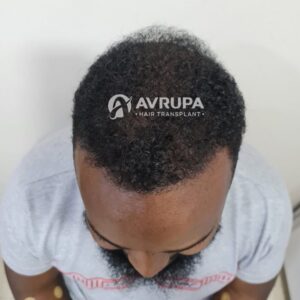
Heat, chemicals, and excessive styling can easily damage it. As a result, many people with Afro hair use special haircare products and techniques to achieve the desired look.
Three Types of Afro Hair
There are many different types of Afro hair, ranging from tight coils to loose curls. The texture of Afro hair varies depending on the individual, but it is generally thicker and coarser than other hair types.
Some common Afro hair types include 4a, 4b, and 4c.
1. Type 4A hair
This is the loosest and most manageable of the three types. It has well-defined curl patterns ranging from fine and wavy to kinky and coiled.
2. Type 4B hair
This hair type is much tighter than Type 4A hair. It has an S-shaped pattern, tends to be very dry, and the coils are less defined.
3. Type 4C hair
Type 4C Afro hair is the tightest, thickest, and most brittle of the three types. It has a zig-zag pattern and requires a lot of moisture to stay healthy.
What is an Afro Hair Transplant, and How is it Performed?
An Afro hair transplant is a type of hair restoration surgery specifically designed for patients of African descent. The technique involves taking hair from areas of the scalp that are not affected by baldness and transplanting it to those that are thinning or bald.
This type of transplant is often used to correct damage caused by tight hairstyles (Traction Alopecia), such as cornrows or braids and baldness. The surgeon will usually make small incisions in the donor area, then carefully remove individual hair follicles and transplant them to the recipient area.

Does Hair Transplant Work for Afro Hair?
There are many misconceptions about hair transplantation. One common belief is that it doesn’t work for Afro hair. However, this is simply not true. A hair transplant procedure can be effective for Afro hair loss as long as a skilled and experienced surgeon performs it. The key is to choose a surgeon familiar with the unique challenges of transplanting Afro hair.
And that’s because Afro hair has a unique texture and curl pattern, in which hair follicles normally curl from under the skin (roots). Consequently, this makes it more challenging to extract afro hair follicles without causing damage. Therefore, a bigger punch might be needed to extract the curly hair follicles and place them in slightly larger incisions.
Also, it’s important to note that the spaces between the incisions are less dense. That’s due to the curly structure of hair and caliber, which takes up more space and gives the illusion of fuller hair.
To wrap up, a hair transplant for African American hair has shown promising results in restoring and achieving a natural-looking hairline.
What are the Challenges Associated with Afro Hair Restoration?
One of the biggest challenges associated with afro hair transplant surgeries is the unique nature of the hair. Afro hair transplants are technically demanding because the hair doesn’t just curl above the skin—it also follows a curved path under the skin. That subdermal curvature, combined with a thicker, more elliptical hair shaft, makes it easier to cut across (transect) follicles if the wrong punch size or angle is used. The hair shaft can also be more prone to breakage when handled dry or with excessive tension.
Because of this, Afro cases require highly experienced, doctor-led teams. Experts typically use Afro-adapted punches, work more slowly, and adjust angles constantly during extraction. Grafts need gentle handling and proper hydration.
Patient factors also matter. A history of traction hairstyles, keloid or hypertrophic scarring, or scarring alopecia such as CCCA must be reviewed and, when present, it must be medically controlled before proceeding with a hair transplant. Aftercare should reduce the risk of ingrown hair and folliculitis, which can be more common with tight curls.
In short, Afro hair transplants are more complex than straight-hair cases, but with the right planning, tools, and skill, excellent, natural-looking results are achievable.
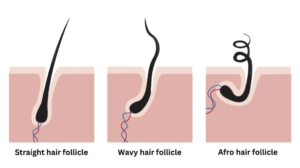
Comparison of Follicles of Different Hair Types
Image source: ClinicAdvisor®
What is the Best Hair Transplant Method for Afro Hair?
There are a few different hair transplant techniques available for Afro hair, but the best option for you will depend on your individual circumstances. One popular option is the FUE technique or follicular unit extraction.
This involves removing small hair follicles from the donor site and transplanting them into the balding area. Another option is the FUT or follicular unit transplantation. This involves taking a strip of skin from the donor area and then removing the hair follicles from that strip onto the balding area. Many hair transplant surgeons prefer FUE for Afro hair over FUT to avoid the risk of keloid.
DHI is a graft placement method that can be used in hairlines and temples. It allows for precise control of depth, angle, and curl direction. It also works well when placed between existing hairs and can reduce handling time for delicate single-hair grafts. But this is only true if the surgeon is experienced with coiled follicles. Improper handling during extraction or while loading grafts into the implanter pens increases the risk of follicle damage.
Ultimately, your specific situation and goals will determine the best hair transplant method for Afro hair. The best thing you can do is to get a free Afro hair transplant turkey consultation from qualified hair transplantation surgeons to determine which option is right for you.
Who is the Best Candidate for an Afro Hair Transplant?
Black hair transplants are becoming increasingly popular as more and more people look for ways to achieve fuller, thicker hair. But who is the best candidate for an Afro hair transplant? In general, the ideal candidate for hair transplantation is someone who:
- Experiencing balding or thinning is a typical pattern of male or female baldness.
- Afro-hair transplants are best suited for people whose natural hairlines and temples are beginning to recede.
- Those with a receding hairline due to hair styling routines that involve excessive pulling and tight braids are known as those with Traction Alopecia.
- Has plenty of hair follicles in the donor region to cover the area being transplanted.
- Has good overall health.
What are the Benefits of Having an Afro Hair Transplant in Turkey?
If you’re looking for a safe, affordable place to have an Afro hair transplant surgery, Turkey should be at the top of your list. One of the benefits of Afro hair transplants in Turkey is that they can help patients achieve natural-looking results. That’s because the donor hair will match the texture and curl pattern of the patient’s own hair.
In addition, some highly experienced doctors specialize in Afro hair transplant in Turkey. These doctors have the expertise and have performed on hundreds of patients with Afro-textured hair. Turkey is also known for its high-quality medical facilities and its competitive prices.
At Avrupa Hair Transplant, we have performed many hair transplants for patients of African descent, and they obtained amazing results.
Below, you can check out some of our Afro hair transplant results and see how natural and full they look.
Afro Hair Transplant Results in Turkey: Before and After
The results of Afro hair transplants in Turkey can be quite impressive. Turkey has some of the best hair transplant experts in the world with distinctive experience with all different types of hair. Afro hair is especially tricky to transplant, but the results can be very natural-looking if done correctly.
Here are some of our previous patients’ results with Afro hair.
Case #1
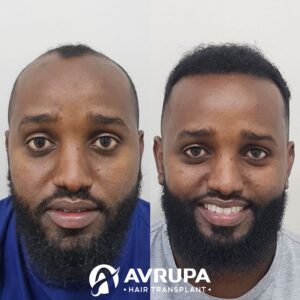
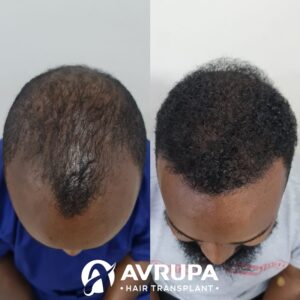
Case #2
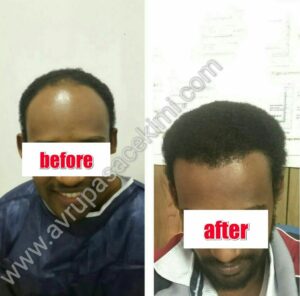
Case #3
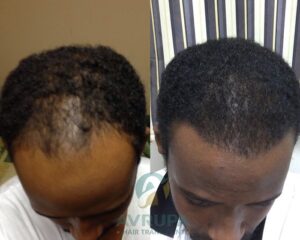
Hair Growth Timeline After Afro Hair Transplant
The timeline for hair transplant growth will vary from person to person; however, most people can expect to see some initial growth within six months after surgery. Once the transplanted hair starts to grow, patients can see gradual improvements in their appearance over several months.
It usually takes 8 to 9 months to see good results. However, this duration can extend to a year or 18 months to see the full thickness in some people.
How Much Does an Afro Hair Transplant Cost in Turkey?
Afro-hair transplants are typically more expensive than other hair transplant operations. This is due to the unique challenges of transplanting this type of hair. However, African hair transplants in Turkey can be performed for a fraction of the cost while maintaining high-quality results.
The average cost of an Afro hair transplant in Turkey is around $1850-$4000, all-inclusive. The exact price will differ based on the surgeon’s expertise, the clinic’s location, the technique used, and the length of the operation.
However, in all cases, this is significantly lower than the surgery cost in many other countries. As a result, a hair transplant in Turkey is an excellent option for individuals with Afro hair.
How to Find the Best Surgeons for Afro Hair Transplants in Turkey?
If you’re considering a Turkey Afro hair transplant, consider a few things when choosing a surgeon. First, finding a surgeon with experience with Afro-hair transplants is important. This hair type is unique and requires special care and attention during the transplant process.
Our team at Avrupa Hair Transplant Clinic has extensive experience performing hair transplants for afro hair types, and the results are fantastic, as shown in the before-and-after cases.
What is the Success Rate for Afro-American Hair Transplants?
In general, the success rate of African American hair transplants in Turkey is quite high as long as they are performed by a skilled surgeon. So, it is important to choose hair transplant specialists with experience performing this type of procedure and who know how to handle such hair types carefully.
Most patients report satisfaction with the results of their surgery, and most Afro hair transplant procedures successfully increase hair density significantly.
In fact, our clinic has been featured among the best African American hair transplant clinics in Turkey, a recognition that reflects both our experience and patient outcomes
Additionally, the success of the surgery depends on the health of the scalp and the availability of sufficient donor hair. Finally, the patient’s adherence to the post-op instructions also contributes to the final results.
What Should I Expect after my Afro Hair Transplant Procedure?
After having an Afro hair transplant in Turkey, you can expect the transplanted hair to fall out within two to three weeks. This is normal and part of the healing process. The new hair follicle will begin to grow hair starting from the 3rd month, and you should see full results within nine to twelve months.
In the meantime, it is important to keep your head clean and dry during this healing period to prevent infections. You may also be instructed to use a mild shampoo when washing and avoid sun exposure.
After a hair transplant, patients usually experience itching and tenderness around the transplanted site as their scalp adjusts to the new hair. This is a good sign that the hair is taking root and is ready to grow.
You can return to your normal activities within a week or so after your hair transplant. You can enjoy your new head full of hair for many years with proper care.
How Long Will It Take to Recover After an Afro Textured Hair Transplant?
Although the exact time frame for recovery after a hair transplant varies from person to person, most people can expect to recover completely within 10-14 days. To ensure a successful recovery process, it’s important to follow your doctor’s post-operative instructions carefully:
- For the first few days after the transplant, you’ll need to sleep with your head elevated to minimize swelling.
- You’ll also need to avoid strenuous activity and wear loose-fitting clothing to avoid putting pressure on your newly transplanted follicles.
- It’s normal to experience some bruising, tenderness, and minimal discomfort around the surgical site, but this should resolve within a week.
- Be sure to keep the transplanted and donor site clean by washing your hair as directed by your doctor.
- You should avoid smoking for 2 weeks after the surgery to allow normal blood flow to the hair grafts.
- Also, you should avoid alcohol consumption for a week after the operation.
- You should avoid prolonged exposure to direct sunlight and UV rays, which include spending time at the beach or using tanning beds.
By following these guidelines carefully, you can recover quickly and enjoy your new hair.
Ready to start your hair afro transplant journey in Turkey?
Get a free online afro hair transplant consultation now, and a cost estimate